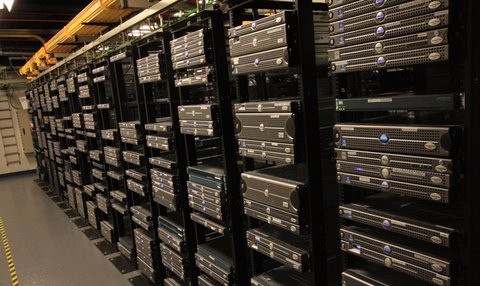If Amazon can't make the cloud work, can anyone?
If Amazon can't make the cloud work, can anyone?

Inside a data centre. Photo from Neospire on Flickr under Creative Commons.
You might have read about problems last month with Amazon’s web hosting service. These affected many well-known websites, including Q&A social network Quora, Foursquare and Reddit.
The outage sparked some debate about how far businesses can rely on cloud services, especially if they’re unable or unwilling to commit to services offering a high level of security and backup.
Don’t let Amazon cloud your decisions
’The cloud’ has been billed as the be all and end all, but like any other business-critical service, you can only count on it if it’s backed up by solid business continuity planning.
Reading between the lines, the Amazon customers least affected by the outage were those with budgets big enough to afford the company’s premium service. They get the peace of mind of knowing that their data’s stored in more than one location.
However, many start-ups and small businesses use cloud services in order to benefit from low up-front costs and manageable ‘pay as you go’ charging. For some, this means they invest in a bottom dollar package from a mass market provider.
But if you don’t choose wisely, taking this route can end up compromising business continuity. What’s more, you may eliminate one of the main reasons for taking the cloud computing route in the first place: complete assurance that your data and systems are protected in every eventuality.
Multiple locations matter
If your chosen cloud computing supplier can only offer hosting from a single location – also called a ‘data centre’ - within your budget allowance, it’s usually worth shopping around. A niche provider that caters specifically for smaller businesses like yours may understand and meet your requirements more effectively.
The key thing is the number of places where your data is stored. Without at least two data centres, you leave yourself at higher risk of service interruptions and failures. Having all your applications and data stored at one site may be no safer than sticking your server in the corner of the office.
True, cloud services have expert engineers available to fix problems quickly, but if your data’s hosted in at least two separate locations it is highly unlikely that both environments will be affected at the same time. So if there’s a problem, you can keep working as normal.
Do remote networks right
My message to companies out there that are questioning cloud technologies after the Amazon outage is to take heed: remote networks are more secure than many traditional systems and, moreover, easier to reinstall should onsite disaster strike.
However, this only applies if you’ve got the right provisions in place. Make sure your cloud provider has more than one data centre, and examine their business continuity plans in detail.
Adrian Smith is MD of Heywood-based IT services provider Flexsys.




Comments
Add a comment